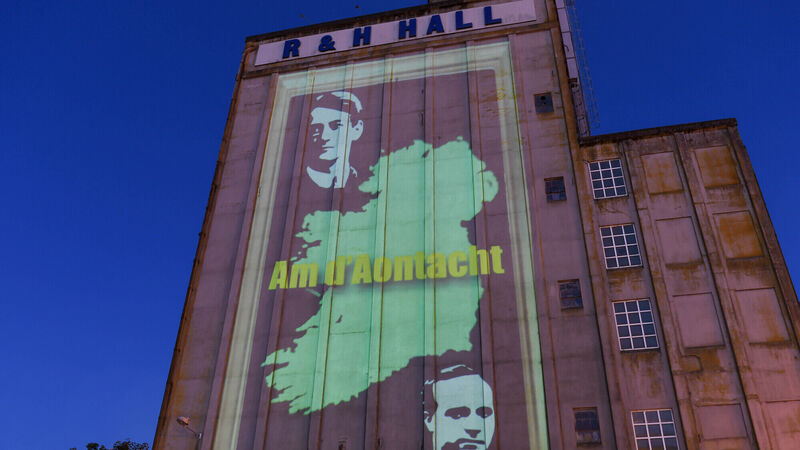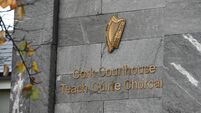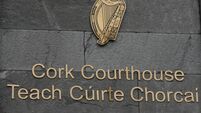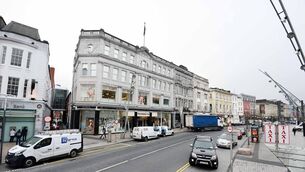Cork politicians believe Irish unity is possible

A projected image of former Lord Mayor's of Cork Terence MacSwiney and Tomas MacCurtain on the R & H Hall building in Cork City. Picture: David Keane.
THE topic of a united Ireland is one that is being discussed much more regularly and openly, according to a number of parties in Cork and, for the first time, it appears to be within grasp.
Sinn Féin TD Thomas Gould said his party is keen to help “kickstart” the conversation on a united Ireland and wants to have a discussion about the topic so that “everyone would have their input”.
Recently, images of Terence MacSwiney and Tomás Mac Curtin were projected onto the Docklands’ R&H Hall in what was the start of a wider Sinn Féin campaign in Cork to discuss Irish unity.
“We’re looking for people to engage with us and to promote and to encourage the Government to now step forward and to get involved in the debate,” said Mr Gould.
The Cork North-Central TD said they see “great engagement” from young people and all age groups on the topic.
“It’s becoming an issue now where people are starting to have opinions and thoughts on and what we’re trying to do is get those people to have those thoughts."
With more and more people stopping him on the street to ask questions or discuss the topic of a united Ireland, he said he believes people feel free to have a conversation about it now.
“I think part of it is because of the peace process, they’ve seen the work that has been done over the years, there’s been a lot of positives. Don’t get me wrong, there’s still an awful lot of work to do, but people look at the vast majority of people in the six counties and the peace that has been brought about there and the changes and they feel that this is a conversation they can have now.”
Even though it is still a political conversation, it is “much more of a kind of vision to Ireland’s future”, according to Mr Gould.

Welcoming recent discussion from Fine Gael on a united Ireland, he said: “If we’re going to get Irish unity, it won’t be just Sinn Féin that delivers it. We know that. This will have to be delivered by a broad base of people from every side getting involved.
“When you see Fine Gael openly discussing Irish unity, that’s a positive,” he said.
Speaking on Cork’s role, Mr Gould noted Tomás MacCurtain who, he said, was recognised as being “a Lord Mayor for everybody”.
“People appreciated his inclusion of everyone, so we feel Cork has a great tradition, both from a Republican point of view but also as leading the way in Ireland, and that’s what we’re hoping to do.
"We’re hoping to have these conversations now in soccer clubs, GAA clubs, community associations. We want to see people when they go for coffee, or lunch or dinner, they have these conversations.”
“We want to make people feel at ease that they can have these conversations with their family, friends or workmates.”
He said that the ambition is to see a united Ireland “in the foreseeable future”, adding that the referendum is key.

Tánaiste Leo Varadkar recently told the Fine Gael ard fheis that Irish reunification should be the party’s “mission” and called for an increase in engagement with communities in Northern Ireland.
He said the “tectonic plates were shifting” in the region and called for his party to establish a branch across the border.
“It means the unification of the people of our island as well as territory of Ireland and it is a legitimate political aspiration,” he said.
“We should be proud to say that unification is something we aspire to. It should be part of our mission as a party to work towards it.”
Fine Gael TD Colm Burke said the need for more co-operation between North and South was proven during the Covid-19 pandemic.
“We could have achieved a lot more if we approached in an all-island basis rather than we doing one thing and they doing something else above in Northern Ireland which was a part of their problem,” Mr Burke said.
“I do think that we could do a lot more in regards to co-operation.”
In terms of education, Mr Burke said “a lot of work” is to be done in the area.
While the Cork North-Central TD was Lord Mayor of Cork, he visited Shanghai as part of a connectivity programme and for him, a lack of such connections between universities may have been “one of the mistakes”.
“We haven’t really progressed that from a Northern Ireland point of view and down south for instance, we don’t have a programme like that — or I’m not aware of it — between the universities in Northern Ireland and say, UCC.
“I think that’s one of the mistakes that we might have made. We should have had a lot more co-operation on education on that area where you do say, a four-year course in UCC, you do 12 months in Belfast and you do three years in Cork and likewise.”
Mr Burke also noted a need for a university in Derry which he said would be “very much a cross-border effort”.
“And I think that is one of the things that we need to do.”
A united Ireland is “absolutely” something he would like to see in the foreseeable future, he said.
“It’s something that we should strive to achieve, but it must be by way of consultation, and it must be on the basis that no one feels that they have been forced into it.”
Comparing the approach to Covid-19 to foot-and-mouth, Mr Burke said there had been an all-island approach.
“Yet when we were dealing with human life, we didn’t approach it in the same way, and I think that’s extremely sad.” He recalled the “total lockdown in the island of Ireland”.
“And we didn’t do the same thing with Covid.”
An Rabharta Glas Cork city councillor Lorna Bogue said it seems as though “the tectonic plates have shifted a bit so that co-operation that existed for foot and mouth, for some reason didn’t exist with Covid.”
“That’s a problem, but it’s also not impossible for that type of co-operation to happen, even post-Brexit, it’s not impossible for it to happen.”
Ms Bogue said it is up to people who are living in the area to make their own decisions about a united Ireland.
While there are a lot of issues that would need to be ironed out before any move towards a united Ireland, she said there is also a lot we can learn from the North.
“From an economic perspective, in the Republic of Ireland we tend to think of a united Ireland as being ‘oh well this will be great for everyone involved’, but if you’re someone who is working class and living in Northern Ireland, you have access to the NHS, you have access to housing, you have access to all of these things that in the Republic of Ireland, we actually wouldn’t be able to offer these things at this moment in time.”
She said there is “definitely a space” for Cork to discuss the issue in terms of inclusiveness and how we can welcome and integrate new communities here and in Ireland.
Green Party councillor Oliver Moran said he thinks “a united Ireland is possible, but it needs to be one that is based on a shared history and culture, with all its complexity and contradictions”.
“Unfortunately, a lot of Irish nationalism has come to be based on denying the validity of unionist interests and experience,” he said.
“Ironically, this also denies the historical experience of many Irish nationalists.”

Before a united Ireland, he said we need to “fully support implementing the institutions of the Good Friday Agreement”.
“In particular, I’m very eager that the North/South Civic Forum envisioned by the agreement would be established.
“This was envisioned as an independent consultative forum, made up of social partners and being representative of civil society on both sides of the border.
“I think everyday people have more capacity to take the politicking and heat out of discussion about united Ireland and north-south co-operation.
“Another idea was to use a citizens’ assembly of randomly selected people, north and south, to make up this forum,” he added.
Solidarity TD Mick Barry said that many people will favour a united Ireland and “ending the historic wrong of partition”.

“It’s always been a legitimate aspiration,” he said, “and it’s probably a growing one now. But clearly, there are two conflicting national aspirations on this island.”
“In the North, we have a divided society. And I don’t think the border issue can be resolved by outvoting the Protestant community in a border poll.”
The Cork-North Central TD said he believes there are genuine fears about becoming “the new coerced minority” which he said is understandable given their experience of the Troubles.
“However, I do believe that a struggle by working-class people, Catholic and Protestant, North and South, for social change could break the deadlock.
“A united struggle to end capitalism and establish socialism might well bring about a unitary state. However, I would argue that this could only come about on the basis of consent — there must be no coercion of the Protestant minority."
Recently, Taoiseach Micheál Martin said he has created the Shared Island Unit in order to facilitate dialogue and to give a voice to people with different perspectives.
“We are looking at the broader picture in relation to health, education, and tourism. I have met with the North-South bodies and we are hoping to create more projects for them,” he said.
“We need to adopt the John Hume approach of uniting people and their hearts and minds. There is so much more we can do.”
As a history teacher and a Fianna Fáil representative, Padraig O’Sullivan TD said it is “an honour” to be in the middle of having the debate on a united Ireland and to possibly be involved in the coming years.
“It’s something I’m personally looking forward to and I think the other political reps in Cork North Central would be the same. It’s historic in that regard,” he said.
Mr O’Sullivan said that if he had been asked when he started his history degree in the early 2000s if he would see a united Ireland in his life, he would have an entirely different answer.
“But obviously the Good Friday Agreement is in place since the late 90s and there is peace and prosperity across the island, North and South and that has presented us with this opportunity to have this debate. Never in my life did I think we would even be having this debate as we are and have a realistic chance of actually achieving it.
“People are talking about it, we as a party are talking about it and most definitely we do want to see it happen.”
The discussion on a united Ireland is something that is also happening within the Fianna Fáil party, he said.
“It’s something we need to work towards and I think that debate needs to happen.
“Whether the referendum or the vote that would ultimately make a decision on it happens in the coming years or further down the line, I think that’s something I would be quite open to, but I think it’s important to weigh up the pros and cons and have an informed debate so we can bring people with us and make the best decision for both jurisdictions.
“I do believe the best decision is to unite the country.”
While a number of different factors will contribute to people’s decision on unity, speaking on Cork’s role, Mr O’Sullivan stated that “Cork is benefiting recently from massive Government investment.
“And I think if Belfast was to see the type of things that are happening in Cork, whether it’s our railway announcement, whether it’s the docklands they can see that those types of developments and funding are in place, hopefully, it will make an economic decision for some people.”
A united Ireland is something the Fianna Fáil TD firmly hopes to see in his lifetime; however, an informed debate will be needed in order to achieve the right result in a referendum.
Mr O’Sullivan said he does think it is possible but reiterated that it can’t be “rushed”.
“It’s going to take time. It’s going to take sitting down with people who do come from different cultures, different perspectives and different political outlooks and determining what’s the best for the island.”







 App?
App?


